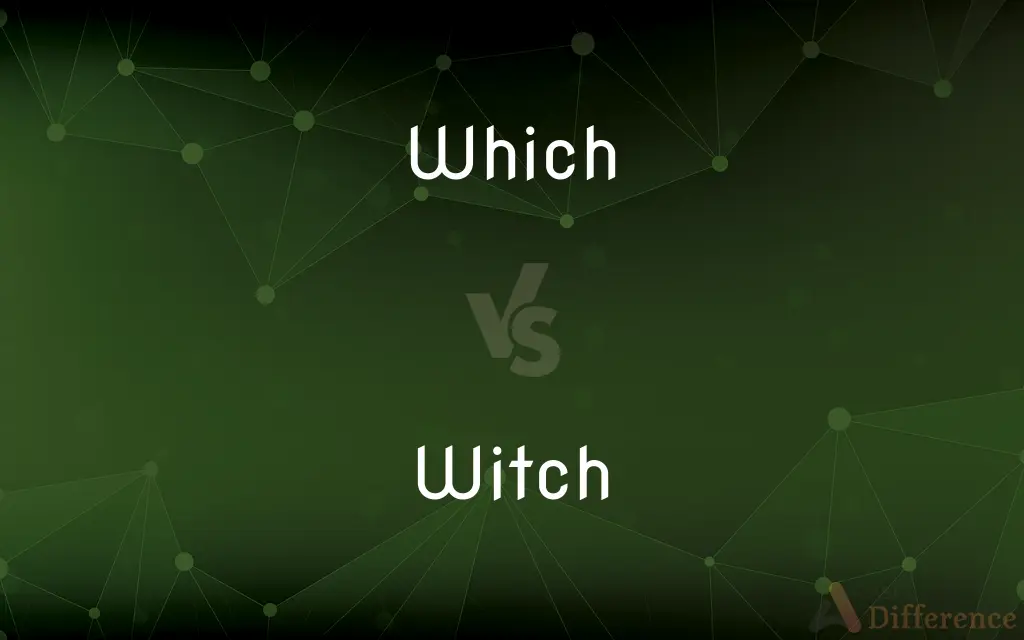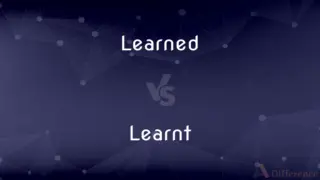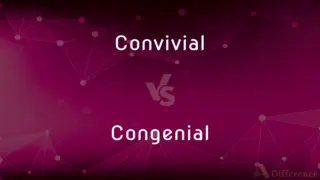Which vs. Witch — What's the Difference?
Edited by Tayyaba Rehman — By Fiza Rafique — Updated on September 26, 2023
"Which" is a pronoun used to introduce a specific item or items from a larger set, while "Witch" refers to a person, traditionally a woman, believed to practice magic or witchcraft.

Difference Between Which and Witch
Table of Contents
ADVERTISEMENT
Key Differences
"Which" and "Witch" are classic examples of homophones in the English language; words that sound alike but carry different meanings. "Which" functions primarily as a pronoun or determiner, posing questions about a specific choice or pointing to one among several. For instance, when faced with multiple alternatives, one might inquire, "Which do you prefer?" It adds clarity by distinguishing one item from the rest.
On the other hand, "Witch" wades into the realm of folklore and cultural narratives. Historically, a "Witch" was seen as someone, often a woman, with the ability to wield magic, potions, and spells. Sometimes revered, at other times vilified, witches have been fascinating figures weaving through tales and legends.
From a linguistic lens, while "Which" is about choice and specificity, "Witch" identifies an individual with supposed supernatural powers. The former is always neutral, simply seeking clarification. The latter, however, can conjure a myriad of emotions, from awe and respect to fear and suspicion, depending on cultural and historical contexts.
Comparison Chart
Part of Speech
Pronoun/Determiner
Noun
Primary Function
To introduce a specific choice or item from a set
Refers to someone believed to practice magic
ADVERTISEMENT
Emotional Undertone
Neutral
Can range from awe to fear depending on context
Example Usage
"Which book do you like?"
"The village believed she was a witch."
Historical Connotation
None
Tied to folklore, often associated with magical or supernatural acts
Compare with Definitions
Which
An interrogative pronoun asking about a choice.
Which flavor do you want?
Witch
A derogatory term for an unpleasant woman.
She was nicknamed the witch of Wall Street.
Which
Used to define or explain.
The time, which was late, surprised everyone.
Witch
A person, especially a woman, claiming or popularly believed to possess magical powers and practice sorcery.
Which
Used to indicate a type or category.
Which type of apple is this?
Witch
A believer or follower of Wicca; a Wiccan.
Which
Used in statements of preference.
I don’t know which to choose.
Witch
(Offensive) An old woman considered to be ugly or frightening.
Which
Used to point out a specific thing among a group.
The hat, which is red, belongs to John.
Witch
A woman considered to be spiteful or overbearing.
Which
What particular one or ones of a number of things or people
Which part of town do you mean?.
Witch
(Informal) A woman or girl considered to be charming or fascinating.
Which
Any one or any number of; whichever
Use which door you please.
Witch
One particularly skilled or competent at one's craft
"A witch of a writer, [she] is capable of developing an intensity that verges on ferocity" (Peter S. Prescott).
Which
Being the one or ones previously mentioned or implied
It started to rain, at which point we ran.
Witch
To work or cast a spell on; bewitch.
Which
(interrogative) What, of those mentioned or implied.
Which song shall we play?
They couldn't decide which song to play.
Which one is bigger?
Show me which one is bigger.
Witch
To cause, bring, or effect by witchcraft.
Which
The/Any ... that; whichever.
You may go which way you please.
Witch
To use a divining rod to find underground water or minerals; dowse.
Which
Designates the one(s) previously mentioned.
He once owned a painting of the house, which painting would later be stolen.
Yesterday, I met three men with long beards, which men I remember vividly.
For several seconds he sat in silence, during which time the tea and sandwiches arrived.
I'm thinking of getting a new car, in which case I'd get a red one.
Witch
A person who practices witchcraft.
Which
(interrogative) What one or ones (of those mentioned or implied).
Which is which?
By now, you must surely know which is which.
Which is bigger, the red one or the blue one?
I'm unable to determine which is bigger.
Which of these do you want to keep?
Witch
(now usually particularly) A woman who is learned in and actively practices witchcraft.
Which
The/Any ones that; whichever.
Please take which you please.
Witch
An ugly or unpleasant woman.
I hate that old witch.
Which
(relative) Introduces a relative clause giving further information about something previously mentioned.
He walked by a door with a sign, which read: PRIVATE OFFICE.
I found my camera, which I thought I'd lost, under the bed.
No art can be properly understood apart from the culture of which it is a part.
He had to leave, which was very difficult.
Witch
One who exercises more-than-common power of attraction; a charming or bewitching person.
Which
Used of people (now generally whom, that; which remains possible with words also referred to by it like baby, child).}}
Witch
One given to mischief, especially a woman or child.
Which
Of what sort or kind; what; what a; who.
And which they weren and of what degree.
Witch
(geometry) A certain curve of the third order, described by Maria Agnesi under the name versiera.
Which
A relative pronoun, used esp. in referring to an antecedent noun or clause, but sometimes with reference to what is specified or implied in a sentence, or to a following noun or clause (generally involving a reference, however, to something which has preceded). It is used in all numbers and genders, and was formerly used of persons.
And when thou fail'st - as God forbid the hour! -Must Edward fall, which peril heaven forfend!
God . . . rested on the seventh day from all his work which he had made.
Our Father, which art in heaven.
The temple of God is holy, which temple ye are.
Witch
The storm petrel.
Which
A compound relative or indefinite pronoun, standing for any one which, whichever, that which, those which, the . . . which, and the like; as, take which you will.
Do not they blaspheme that worthy name by the which ye are called?
Witch
Any of a number of flatfish:
Witch
Glyptocephalus cynoglossus (Torbay sole), found in the North Atlantic.
Witch
Lepidorhombus whiffiagonis (megrim), found in the North Atlantic.
Witch
Arnoglossus scapha, found near New Zealand.
Witch
The Indomalayan butterfly Araotes lapithis, of the family Lycaenidae.
Witch
A cone of paper which is placed in a vessel of lard or other fat and used as a taper.
Witch
(intransitive) To dowse for water.
Witch
To practise witchcraft.
Witch
(transitive) To bewitch.
Witch
A cone of paper which is placed in a vessel of lard or other fat, and used as a taper.
Witch
One who practices the black art, or magic; one regarded as possessing supernatural or magical power by compact with an evil spirit, esp. with the Devil; a sorcerer or sorceress; - now applied chiefly or only to women, but formerly used of men as well.
There was a man in that city whose name was Simon, a witch.
He can not abide the old woman of Brentford; he swears she's a witch.
Witch
An ugly old woman; a hag.
Witch
One who exercises more than common power of attraction; a charming or bewitching person; also, one given to mischief; - said especially of a woman or child.
Witch
A certain curve of the third order, described by Maria Agnesi under the name versiera.
Witch
The stormy petrel.
Witch
A Wiccan; an adherent or practitioner of Wicca, a religion which in different forms may be paganistic and nature-oriented, or ditheistic. The term witch applies to both male and female adherents in this sense.
Witch
To bewitch; to fascinate; to enchant.
[I 'll] witch sweet ladies with my words and looks.
Whether within us or withoutThe spell of this illusion beThat witches us to hear and see.
Witch
A female sorcerer or magician
Witch
A being (usually female) imagined to have special powers derived from the devil
Witch
An ugly evil-looking old woman
Witch
Cast a spell over someone or something; put a hex on someone or something
Witch
A person practicing magic or sorcery.
The townsfolk accused her of being a witch.
Witch
A character from folklore or tales.
The witch in the story lured children into her candy house.
Witch
An enchanting or captivating woman.
She was a witch with her mesmerizing voice.
Witch
A practitioner of Wicca.
The modern witch celebrates nature.
Common Curiosities
Is "Which" a noun?
No, it's primarily a pronoun or determiner.
Is "Which" always about making a choice?
Mostly, but it can also introduce specifics or clarify details.
Are witches always seen as evil?
Not always. Perceptions vary across cultures and time periods.
Is "Witch" always associated with magic?
Mostly, but it can also be a term of endearment or insult.
Is "Which" used only in questions?
No, it can also be used in declarative sentences.
Can "Which" be used in non-interrogative sentences?
Yes, e.g., "The car which is blue is mine."
How do I know when to use "Which"?
Context is key. "Which" introduces or clarifies items.
Are "Which" and "Witch" spelled similarly?
They sound alike but have different spellings.
Are all witches women?
Traditionally, yes, but in modern contexts, a witch can be any gender.
Is the concept of a "Witch" universal?
While details vary, many cultures have tales or concepts of witches.
Do "Which" and "Witch" ever mean the same thing?
Never. They always have distinct meanings.
Do all cultures fear witches?
No, in some cultures, witches are revered or respected.
Are witches real?
While many historical figures were accused of witchcraft, the supernatural portrayal is a matter of belief.
Is "Witch" related to Wicca?
Yes, practitioners of Wicca may identify as witches.
Can "Which" be replaced by "that"?
Sometimes, especially in defining relative clauses, but nuances differ.
Share Your Discovery

Previous Comparison
Learned vs. Learnt
Next Comparison
Convivial vs. CongenialAuthor Spotlight
Written by
Fiza RafiqueFiza Rafique is a skilled content writer at AskDifference.com, where she meticulously refines and enhances written pieces. Drawing from her vast editorial expertise, Fiza ensures clarity, accuracy, and precision in every article. Passionate about language, she continually seeks to elevate the quality of content for readers worldwide.
Edited by
Tayyaba RehmanTayyaba Rehman is a distinguished writer, currently serving as a primary contributor to askdifference.com. As a researcher in semantics and etymology, Tayyaba's passion for the complexity of languages and their distinctions has found a perfect home on the platform. Tayyaba delves into the intricacies of language, distinguishing between commonly confused words and phrases, thereby providing clarity for readers worldwide.
















































